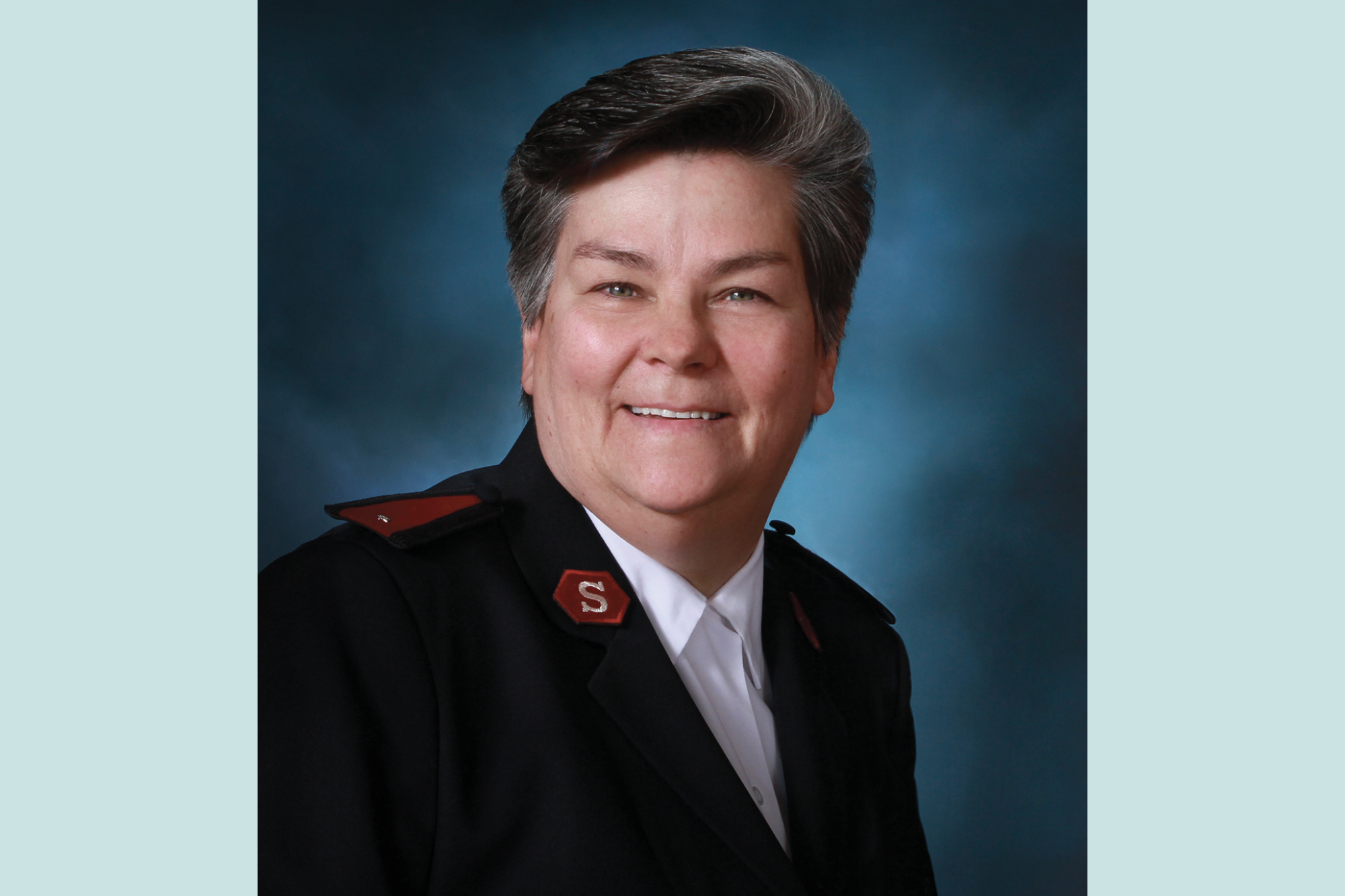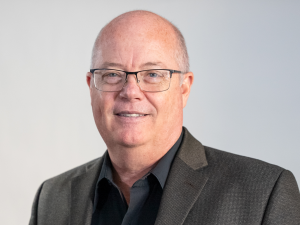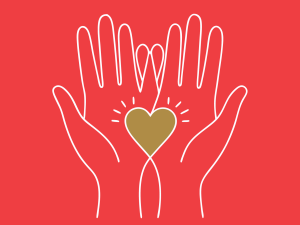Research has shown volunteering improves physical and mental health, provides a sense of purpose, and nurtures new and existing relationships. And it can also get someone involved in a faith community—especially at this time of year.
That’s what happened for Captain Edith Dye-Mabie, who first met The Salvation Army when her husband was a participant in the Adult Rehabilitation Center program. With her children, she got connected to the nearby Salvation Army corps or church and when they asked for volunteers at Christmastime, she showed up.
The rest, as they say, is history—though quite a bit happened along the way.
Today, Captain Dye-Mabie and her husband are corps officers or pastors of The Salvation Army in Roseburg, Oregon, now working to get others involved with those personal invitations that make all the difference.
Show highlights include:
- What Captain Dye-Mabie loves most about Christmas.
- What her first experience volunteering for The Salvation Army at Christmas was like.
- How she was introduced to The Salvation Army.
- What it was like attending chapel at the Adult Rehabilitation Center.
- How she became more involved with The Salvation Army.
- What eventually encouraged her to attend Home League when she was hesitant.
- What her experience as a member of the congregation was like.
- How being a member of The Salvation Army shaped her understanding of church.
- How her family is different today because of The Salvation Army.
- What her experience of Christmas is like as an officer.
- Why volunteers are important to ministry.
- The highlights of Christmas in Roseburg, Oregon, this year.
- How you can get involved with The Salvation Army during the Christmas season.
Listen and subscribe to the Do Gooders Podcast now. Below is a transcript of the episode, edited for readability. For more information on the people and ideas in the episode, see the links at the bottom of this post.
* * *
Christin Thieme: Well, Captain Dye-Mabie, welcome to the Do Gooders Podcast. Thank you so much for joining me today.
Edith Dye-Mabie: Thank you so much for having me.
Christin Thieme: Yes, it’s an exciting time of year, especially in The Salvation Army. So I’m looking forward to hearing more about your involvement and especially at this time of year. And I guess we can start right there. What do you love most about Christmas?
Edith Dye-Mabie: I love hot chocolate, holiday cheer and hope. I love hope because it shines out at this time of year more than any other.
Christin Thieme: Yeah, it really does. It’s nice. I wish it lasted all year, but it’s also fun at this time of year to see it in people’s faces just out and about.
Edith Dye-Mabie: The extra twinkle.
Christin Thieme: Yeah, exactly. Exactly. It’s fun. So I know you first volunteered for The Salvation Army at Christmas back in 2004, I believe. What were your first impressions of the organization at Christmas and what was that volunteering experience like?
Edith Dye-Mabie: Well, “These people are crazy.” And it’s a big beehive of activity, but then you go in the sanctuary and it’s a little bit different. It’s a little bit different.
I first came to The Salvation Army because my husband, Rick, went through the ARC [Adult Rehabilitation Center] program, and I started looking for a way to plant myself in the corps. Major Trimmer said, “Hey, would you like to help out in the office? We’re going to be shredding documents for a couple of weeks.” And I said, “Sure, I would love to do that.” Then there were a couple of announcements during the Holiness meeting that they were looking for volunteers to bell ring and a couple of other things. But I had littles at home, so I couldn’t do that.
She came in one day and she said, “Hey, would you like to shadow the lady that runs our Angel Tree program and help her out? She’s a little bit older and she could probably use somebody to help move things and move bags.” I said, “Sure, I’d love to do that.” And that’s how that got started. Couple years later, we’re doing 350 families out of the corps building.
Christin Thieme: Wow. Yeah, and if you’ve never been around a Salvation Army corps at Christmastime, like you said, Santa calls on us to help get the food and the toys out there in each community at Christmas. So there’s a lot going on. And I know volunteers are definitely needed this time of year especially, but it’s really cool to hear about somebody who did get involved and stuck around. You mentioned that you first came into The Salvation Army through your husband who was part of the recovery program. Do you remember how you first felt joining and attending chapel at an ARC, which is our Adult Rehabilitation Center? What was that like?
Edith Dye-Mabie: I loved attending chapel at the ARC. And it’s a very upfront visual about the redemption that happens with the men who are going through the program. But corps worship is a little bit different. An ARC program, an ARC program is designed for the spiritual regeneration for those who’ve become disaffiliated because of their substance use. So going to the corps, the focus is more about the redemptive power of Christ. And that’s a little bit different. The ARC is working on tools for recovery. The corps is working on spiritual growth. It’s the same desired path, but it’s different perspectives.
Christin Thieme: And you went from attending chapel at the ARC to being involved in the corps. What was that like as you transitioned into that and your family got more involved? How did your family get more involved? And how did that maybe shape or reshape your understanding of church?
Edith Dye-Mabie: Totally reshaped my understanding of church. I had a limited understanding of church in general. My church attendance had been sporadic through a wide variety of ideologies and never really an internal investment. It was more like going with my neighborhood friends down to church because they had to go. Not necessarily that I had to go, but they had to go. So what I saw and what I experienced was very external separate. What happened at the ARC and at the corps was an internal thing. My husband and I did attend the ARC chapel for quite some time. In fact, our daughter, Samantha, was dedicated at the ARC, but, like I said, the focus is about recovery, and it should rightly be so.
There’s nothing for the wives and the kids like you find at a corps. And the corps presents an opportunity to plant yourself as a family, activities for the kids, lots of programming that is family oriented and not about recovery. Recovery’s important. And my husband and I are both recovering addicts, but having that opportunity to be in a fellowship…I attended chapel sitting in the back row in a T-shirt, cut-off jeans and flip-flops, and they loved me anyway. They just loved me anyway.
I misspoke sometimes and misrepresented Scripture sometimes. They loved me anyway, gentle, loving, redirection and helping me understand more about who God is and his redemptive plan that we find in Christ. Mistakes were made. You bet. But they loved us anyway. Always included, always valued, always considered a part of. And coming out of your addiction where you feel so distanced, so disaffiliated, that’s really important, that acceptance and that we care about you and your family. That is important.
Christin Thieme: I know you’ve said that the officer, pastor at the corps kept inviting you to Home League, which is a women’s program, but you didn’t want to go and she kept inviting you. So what finally got you there?
Edith Dye-Mabie: Okay, so to be perfectly blunt, what’s this old drug addict going to do sitting at Home League with a bunch of ladies? She did keep inviting me, and those announcements happened during chapel. And people would come and invite me, but I just didn’t see how I was going to be able to cross the bridge from who I was in my own mind and who I actually could become. What really did it was she kept sending me handwritten invitations in the mail. They weren’t like clockwork, but just about every month, I would get one.
And sometimes it wasn’t just an invitation, it was, “Hey, I noticed that you did this thing and I want to tell you how encouraging it is to see this,” or, “Hey, I read this article. I clipped it for you and put it in the envelope. Take a look at it. Tell me what you think when we’re at Bible study. Oh, and by the way, this is happening at Home League. We’re going to have an outing, we’re going to go to lunch. Would you like to come? We would love for you to come.” And after a while, how many times can you just… LeAnn Trimmer baited that hook and she reeled me in.
Christin Thieme: It’s so simple, but it’s something that anyone can do and clearly makes a big difference that just taking the time to reach out and to let someone know you’re thinking about them and want them to come. I mean, I think no matter what your background, everybody has that feeling of the person you are and the person you could become and that bridge, like you said, and not necessarily feeling like you fit in at first or how do you get involved, and just that personal touch obviously makes a huge difference.
Edith Dye-Mabie: Well, and when you’re a young Christian, a lot of that Home League were retired officers. When you’re a young Christian and you can’t pronounce half the names in the Bible, you feel a little intimidated. The other thing is, I heard on the radio the other day a description between shame versus guilt. Guilt is about something you’ve done, and shame is about you.
And as an addict, you have a space and a place where you need to work on how you feel about you. And it really helped me grow and how I feel about myself now and who I am in Christ now. The past is done. It’s already done. It’s not going to change, but hopefully, I’ll be able to use those lessons to help somebody else.
Christin Thieme: How is your family’s life different as part of The Salvation Army today than it might otherwise have been?
Edith Dye-Mabie: How is it different? It feels like it’s always been part of The Salvation Army at this point. It could have been very different. Thinking back where I used to live when I lived in Felony Flats, it could have been very different, could have been very different for all my children and my grandchildren, and it could have been very negative. Instead, we’re a family, we spend time together, we talk about our spiritual growth together, we discuss, “What do you think Paul was talking about here and what does that actually mean in application to today?”
My daughter, Sam, came home from college and actually is living with us now, and she looks for opportunities to volunteer. She looks for opportunities to get her coworkers to volunteer, and she understands the value in volunteering. It gives you a little stress reduction, it gives you a little peace. And there’s a science, serotonin, dopamine, endorphins, all of that that happens. But there is something special about doing something for someone else and doing it because you’re doing it in his name, not your own. Those things would’ve been lost.
Christin Thieme: So from those early days when you volunteered, when you got involved to today, now you’re an officer, pastor in The Salvation Army, how did you end up taking that route? What made you want to become an officer?
Edith Dye-Mabie: Well, my husband and I sat down one day and we were talking with each other and I said, “We’ve been volunteering, what? Quite a while now, 10 years. Ten years. There’s something else. There’s something else that we should be doing.” And he said, “I kind of feel that way too. Let’s talk to the majors about it.” So we went and talked to them and they said, “The FOF’s coming up. Why don’t you go to Future Officer Fellowship?” We said, “Oh, no, no, no, no. We’re too old. There’s no way we’re going to be officers. No way.” I don’t remember exactly how that conversation happened, but they got us to agree to go. To tell you the truth, I thought I was going to something that would be like a job fair, okay?
And then we were there and Commissioner Knaggs spoke to the gathering the last day and he said, “If you feel like there’s something more that you should be doing, I just want you to stand up.” And usually, I don’t make decisions without my husband, but I stood up and I went, “Oh, snap. I didn’t check that with my spouse,” but he was standing up as well. And we thought, “Well, okay, we’ll just fill out the paperwork and we’ll see what happens.” That was in February, March. And by June, we had been accepted candidates and we would be going in August. I don’t know how it happened so fast. We didn’t have the money for the dental exams. Somebody, a dentist volunteered to do them for us so that we could go.
The physicals that are required? The doctor that we had been seeing said, “I want you to go and I’m going to donate my time at these services for you.”
I mean, it was just uncanny. Things just, they reeled us in.
Christin Thieme: Meant to be. So now as an officer yourself, what is your experience now of Christmas?
Edith Dye-Mabie: I think I look at it from a little bit different perspective now than I did when I was volunteering. There is a little bit of work involved in finding all the money for some of those activities. There’s a lot of prayer that goes into having those funds come, having the toys come when the Angel Tree goes out. There’s a little bit of work that I didn’t know about when I was volunteering in community connections, visiting vendors, the local credit union, the bank, seeing if you can get a tree put up, those kind of things, working with them so that it is the least inconvenient thing to happen in their business. And all of that, when you put it up in prayer, it’s really unbelievable how often things just come together, and it’s never the way I’ve laid it out in my planner, never like my planner.
But there is still the others aspect, Christin. Moms who are still trying to figure out how to make rent every month, go home with gifts for their children and Christmas dinner ready to roll. So they don’t have the additional expense. And the faces, the faces of the little ones when they come to an event that we have here or worship service, they just light up, and it makes all of the worry, prayer, work, disappointments, it makes it all worthwhile.
Christin Thieme: There’s nothing like those little faces at Christmas. And I imagine given your experience having those invitations and having somebody repeatedly try to get you involved, that’s something important to you. So how do you go about trying to involve others all year, but maybe especially at Christmastime?
Edith Dye-Mabie: One of the things is we have a huge utilization of our family services office. And rather than have people do an application for Christmas online, we’re having them come in and doing them face-to-face. Because if you don’t have an opportunity to invite to say, “Hey, I noticed you have little ones. You know what? We’re having a harvest party on the 31st. Starts at 5:30. Hot dogs and chips, games for the kids. They can do their trick or treating in a safe environment. Why don’t you come? I’ll give you a flyer.” I mean, that’s not going to happen when they’re sitting at a computer. So those face-to-face interactions. And then there are some that you interact with and you just know. So thank you, Major Trimmer. Those handwritten notes, they go in the mail, “Hey, we have an opportunity coming up that I thought you might be interested in. Why don’t you come in and we’ll talk about it.” That’s it. Same thing happens in the thrift store, over the counter. You talk to people. You actually talk to people face to face.
Christin Thieme: Yeah, that personal touch. What are the highlights of Christmas in Roseburg specifically this year?
Edith Dye-Mabie: Well, we have Angel Tree. We have our food boxes going out. We are partnering with a couple of different organizations to provide Christmas dinner, Christmas baskets that will have Christmas dinner in them for select groups. We are planning our corps family potluck, which of course, of course. And we have our Battle of the Bells going on, the men versus the women.
Christin Thieme: Oh, boy.
Edith Dye-Mabie: Men’s Fellowship and Home League.
Christin Thieme: Oh, man. Let the competition begin.
Edith Dye-Mabie: Let the competition begin.
Christin Thieme: I love it. Add some fun to it. So finally, what would be your best piece of advice to someone who’s listening and might want to get involved with The Salvation Army this Christmas, but hasn’t yet, maybe isn’t sure how to go about it? What would be your piece of advice?
Edith Dye-Mabie: Decide to do it. Just decide to do it. And if you have one day a week, one hour, two days a week, two hours, whatever you have, go into your local Salvation Army and say, “Hey, I have two hours available on Wednesday from 10 to 12. Is there something I could do? Pack food boxes? Sort toys? Ring bell? Whatever it is.” But the first part is decide to do it. You will not regret it. You will not regret it.
Christin Thieme: Well, thank you so much. Thank you for sharing and sharing your story and telling us how we can all be involved at Christmas.
Edith Dye-Mabie: Amen. Thank you for asking, Christin. Thank you for having me.
Additional resources:
- There’s still time! Join us this season to center your heart—and your children’s hearts—on the meaning of the season, the gift of love, given and received at Christmas. Simply sign up with your email to receive the free downloadable PDF right in your inbox today.
Listen and subscribe to the Do Gooders Podcast now.












